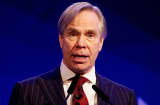What the Federal Reserve giveth, the Federal Reserve could also taketh away.
While the wealthy don't show any signs of worrying about the effects of tighter money , they should be, according to economist Marc Faber.
, they should be, according to economist Marc Faber.
Faber, who publishes The Gloom, Boom & Doom Report, told CNBC's "Squawk Box" on Monday that the wealthy could lose up to half their wealth due to tighter monetary policy and an ensuing collapse in asset prices. He didn't offer a time frame for this to occur.
But he said easy money from central banks—especially quantitative easing—has created global asset bubbles. High-end real estate and other favored assets of the wealthy will be hardest hit.
(Read more: Druckenmiller: Fed robbing poor to pay rich)
"We are in a gigantic asset bubble around the world with prices of real estate having risen a lot," he said. "The high end is at record highs. In the Hamptons, in Mayfair, London, Hong Kong, Singapore, and we have a high inflation overseas, so I think that one day this asset inflation will lead to deflationary collapse one way or the other."
Faber echoes a growing number of financiers—from billionaire hedge fund manager Stanley Druckenmiller to Omega Advisors' Leon Cooperman—who argue that the Fed policy has made the wealthy wealthier, primarily through rising asset prices. Rising stock markets have fueled a record number of millionaires in the U.S., with 1.7 million new millionaires added in the past 12 months, according to Credit Suisse.
(Read more: Why government probably can't close rich-poor gap)
And so far, the wealthy show little concern about the impact of a change in Fed policy. A recent survey from BMO Private Bank found that 61 percent of millionaires say they are better off today than they were before the recession. Only 7 percent say they are worse off. Fully 86 percent have returned to their peak spending levels.
But Faber suggested that, as the main beneficiaries of Fed policy, the rich would also be the hardest hit when the policy changes.
(Read more: Fed could up QE to $1 trillion a month: Marc Faber)
"If you think that high end will never lose anything …," he said. "This is all the result of quantitative easing. The Fed wanted to get the stock markets going. That's what QE-1, 2, and 3 are all about. Move people out the risk curve, and so far it's worked."
Granted, Fed policy isn't the only reason the wealthy are wealthier. The rich were getting richer long before quantitative easing.
(Read more: Want to invest in diamonds? Good luck with prices)
And the wealthy have sought to protect themselves from any Fed-driven downturn with large piles of cash and big investments in hard-assets that are less volatile than stocks .
.
But those hard assets—real-estate, land, art, cars, diamonds and commodities—could fall as hard or harder than stocks when the Fed starts to slow the money spigot. While the wealthy don't seem to be worried now, they ought to be.
when the Fed starts to slow the money spigot. While the wealthy don't seem to be worried now, they ought to be.
—By CNBC's Robert Frank. Follow him on Twitter
@robtfrank
Watch "Secret Lives of the Super Rich", an all-new series airing Wednesdays at 9 p.m. ET/PT. |http://superrich.cnbc.com













